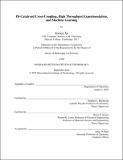Pd-Catalyzed Cross-Coupling, High Throughput Experimentation, and Machine Learning
Author(s)
Xu, Jessica
DownloadThesis PDF (21.56Mb)
Advisor
Buchwald, Stephen L.
Jensen, Klavs F.
Terms of use
Metadata
Show full item recordAbstract
Chapter 1: Monophosphine Ligands Promote Pd-Catalyzed C–S Cross-Coupling Reactions at Room Temperature with Soluble Bases.
The Pd-catalyzed cross-coupling of thiols with aromatic electrophiles is a reliable method for the synthesis of aryl thioethers, which are important compounds for pharmaceutical and agricultural applications. Since thiols and thiolates strongly bind late transition metals, previous research has focused on catalysts supported by chelating, bisphosphine ligands, which were considered less likely to be displaced during the course of the reaction. We show that by using monophosphine ligands instead, more effective catalysis can be achieved. Notably, compared to previous methods, this increased reactivity allows for the use of much lower reaction temperature, soluble bases, and base-sensitive substrates. In contrast to conventional wisdom, our mechanistic data suggest that the extent of displacement of phosphine ligands by thiols is, firstly, not correlated with the ligand bulk or thiol nucleophilicity, and secondly, not predictive of the effectiveness of a given ligand in combination with palladium.
Chapter 2: Practical Machine Learning for Exploring Multidimensional Reaction Spaces
Machine learning (ML) methods have the potential to leverage high throughput experimentation (HTE) data to solve problems in organic chemistry. One such problem is identification of potentially successful reactions for library generation. This work focuses on Pd–catalyzed C–N cross coupling, where the number of combinations of reaction components can easily number in the millions or billions. To address this practical problem, the work herein identifies state–of–the– art HTE–friendly coupling conditions, generates a dataset appropriate to the targeted reaction space, and demonstrates the out–of–scope predictivity of trained models. These methods could enable chemists to quickly filter out unlikely reactions in silico prior to library screening, potentially saving many hours of tedious and expensive experimental work.
Date issued
2022-09Department
Massachusetts Institute of Technology. Department of ChemistryPublisher
Massachusetts Institute of Technology